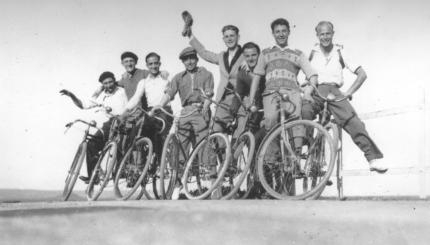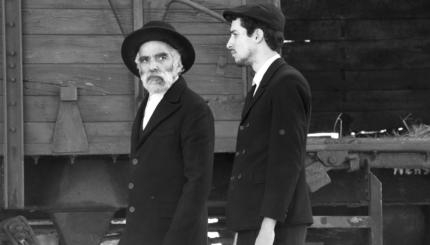A poem, Paul Celan (1920-1970) once said “can be a message in a bottle, sent out in the–not always hopeful–belief that, somewhere and sometime, it could wash up on land.” Widely regarded as one of the greatest poets of the 20th century, Celan gave voice to the poet’s desire to communicate while recognizing the limitations of poetic expression and of language itself.
Holocaust Poetry in German
 Born Paul Antschel in 1920, in Czernowitz, Romania, Celan was the only child of German-speaking Jews. While his father gave young Paul a Jewish education, his mother exposed him to the works of the great German poets such as Rilke and Schiller, inspiring in him a deep love for German language and literature.
Born Paul Antschel in 1920, in Czernowitz, Romania, Celan was the only child of German-speaking Jews. While his father gave young Paul a Jewish education, his mother exposed him to the works of the great German poets such as Rilke and Schiller, inspiring in him a deep love for German language and literature.
Both of Celan’s parents died during the Holocaust. Their deaths, particularly his mother’s, would haunt him for the rest of his life. Celan himself spent the latter years of the war as a forced laborer in a Transnistria internment camp.
For Celan, who spoke several languages, German was the language of his mother, as well as that of his mother’s murderers. He reflected on this in a poem written shortly after receiving news of his parents’ death:

Help us keep Jewish knowledge accessible to millions of people around the world.
Your donation to My Jewish Learning fuels endless journeys of Jewish discovery. With your help, My Jewish Learning can continue to provide nonstop opportunities for learning, connection and growth.
“And can you bear, Mother, as once on a time,
the gentle,
the German,
the pain-laden rhyme?”
Despite, or perhaps because of this, Celan chose to address the Holocaust–or, as he once referred to it, “that which happened”–in German.
Celan had already published several poems in German and Romanian by the time Hitler arrived in Romania. However, his work did not garner serious attention until the aftermath of the war, most famously through his ode to concentration camp victims, “Todesfugue.” Literally translated as “Death Fugue,” it begins
Black milk of morning we drink you at dusktime
we drink you at noontime and dawntime we drink you at night
we drink and drink.
The poem would shake the German literary scene in the post-war years. Its visceral imagery spoke to the horrors of the Holocaust and to the sadistic torture of the concentration camps:
he shouts scrape your strings darker you’ll rise up as smoke to the sky
you’ll then have a grave in the clouds where you won’t lie too cramped.
In his acceptance speech upon receiving the Brehmen Prize for Literature, Celan said that, after the Holocaust, “only one thing remained reachable, close and secure amid all losses: language. Yes, language. In spite of everything, it remained secure against loss.”
Writer, Translator, Communicator
In addition to writing poetry, Celan translated the works of other poets, among them Emily Dickinson and Osip Mandelstam, into German. Celan felt a particular kinship with the Russian Mandelstam, who, like himself, was a Jewish poet writing within the framework of a decidedly non-Jewish literary tradition. Gershom Sholem, Walter Benjamin, Theodor Adorno, and especially Franz Kafka were some of the Jewish thinkers and writers from whom Celan drew inspiration, and he counted Nobel laureate Nelly Sachs, the German-Jewish poet and dramatist, as a close friend.
While Celan often referred to Jewish themes in his poems, such as exile and redemption, he disliked being categorized as a specifically Jewish poet. And yet there was no escaping his Jewishness. Indeed, the scholar and translator John Felstiner discovered among the poet’s final writings what he described as “pained scrawlings” of the fundamental Jewish expression of faith, the Shema, in Hebrew. Felstiner titled his acclaimed biography of the poet Paul Celan: Poet, Survivor, Jew; all three, it appears, were defining aspects of Celan’s poetry and person.
Particularly intriguing was Celan’s ambiguous relationship with the German philosopher Martin Heidegger, a one-time member of the Nazi party. Celan had studied Heidegger’s work, which he greatly admired, and Heidegger had followed Celan’s poetry for some time. The two met for the first and only time in 1966, when Celan gave a reading at Freiburg University, which Heidegger attended. After the reading, Heidegger invited the poet to his home. The meeting inspired Celan’s poem “Todtnauberg” (literally “Death Mountain”), named for the location of Heidegger’s residence:
The poem seems to indicate a desire, on the part of Celan, for some sort of explanation, an apology, a confession of guilt, perhaps, from the philosopher:
a hope, today,
for a thinker’s
word
to come
in the heart.
It is not known what transpired during the meeting, but the poem suggests that Celan did not receive the hoped-for explanation.
Exile & Redemption
After the war, Celan went on to live as an expatriate in Paris–a Jew among gentiles, a German among the French. In Paris, he met and married the graphic artist Gisèle Lestrange, a non-Jew. The couple had one son, Eric.
Though he visited Israel later in life, and considered the possibility of immigrating to the Jewish state, Celan said he ultimately saw himself as “perhaps one of the last who must live out to the end the destiny of the Jewish spirit in Europe.”
Celan may have seen in his work an opportunity to redeem the German language–which he so loved–from the depravations of Nazism. More likely, though, he simply could not imagine tearing himself away from his poetry. As he once pointed out: “There is nothing on earth that can prevent a poet from writing, not even the fact that he’s Jewish and German is the language of his poems.”
A Tragic Ending
Throughout his life Celan suffered from severe mental and emotional anguish. A particularly serious bout of depression occurred after Claire Goll, the wife of poet Yvonne Goll, accused Celan of plagiarizing from the works of her husband, which Celan had translated. Following his hospitalization after a suicide attempt in the 1960s, Gisèle requested that Celan move out of their family home.
Celan spent his last years alone, bereft of family and friends, and sinking further into depression. He wrote his final poems in this state–many of them difficult to understand, but also quite beautiful. In the end, Celan died by his own hand, drowning himself in the Seine River, just outside of his Paris apartment in April 1970.
Much of Celan’s poetry seems to emanate from a desire for deep, meaningful communication. And yet, one wonders what communication really meant to this poet, in light of one of the most striking of his final poems:
A LEAF, treeless
for Bertolt Brecht:
What times are these
when conversation
amounts to a crime
from taking in so much
that is said?


